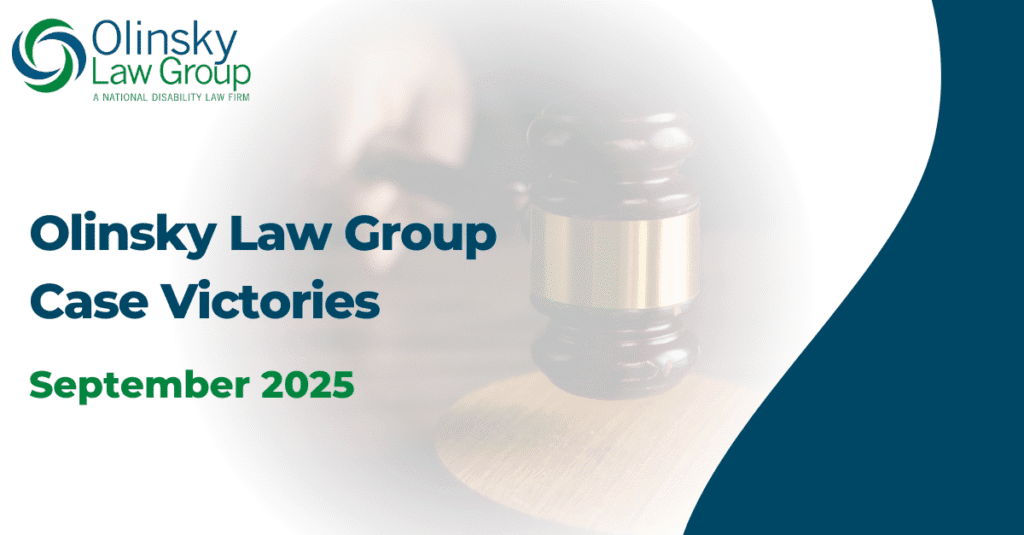Case Victories – September 2025

We’re frequently asked how we win remands on the many cases that get referred to us. We have found that almost all ALJ decisions have errors in them. It’s pointing out those errors to OGC and the Court which procures the remand.
We are presently finding that the ALJs are not following the new regulations on supportability and consistency. If your client’s decision did not sufficiently analyze both the supportability and consistency of all the medical opinions, we want to review that case for federal court.
We’re excited to share some of our recent case victories with you. Here you can read details directly from our attorneys.
Stephens v. SSA (cv-24-579-JWD-RLB) | Middle District of Louisiana
The Court found the ALJ erred in failing to find Type I Diabetes and Peripheral Neuropathy to be a severe impairment at step two of the sequential evaluation process, despite evidence of uncontrolled Diabetes requiring the use of an insulin pump several times a day, being admitted to ICU for Diabetic Ketoacidosis twice, and having severe neuropathy. The Court found the ALJ “did not actually apply the correct legal standard in his severity findings.” The Court found Ms. Stephens “has made the necessary de minimis showing of severity.” This was harmful error because the remainder of the ALJ’s determination was tainted by the ALJ’s step two error.
Taylor v. SSA (6:24-cv-00763-LEK-PJE) | Northern District of New York
The MJ recommended remand in a claim for childhood benefits where the ALJ was willing to apply the favorable Committee on Preschool Special Education evaluation report to only one functional category and not another where it equally applied. The Court wrote, “it appears the ALJ is cherry-picking information from one source and applying it contradictorily…Therefore, the ALJ’s decision is not supported by substantial evidence. OGC did not object to the Magistrate’s R&R.
Burnes v. SSA (1:25-cv-03008-SAB) | Eastern District of Washington
Partner Matthew McGarry was able to secure a directed finding of disability and calculation of benefits from the Chief District Judge of the Eastern District of Washington. Claimant’s case had been remanded multiple times and had been ongoing since 2015, and as such, was still subject to the treating physician rule. The ALJ’s reasoning for discounting the opinion, which included a lack of grip abnormalities (when the doctor opined no manipulative limitations whatsoever) was patently deficient. The Court declined to give the Commissioner a fourth bite at the apple.
Sander v. SSA (3:24-cv-1911-JO-DEB) | Southern District of California
Plaintiff appealed an Unfavorable Decision by ALJ Schum which had concluded with a finding of no severe impairments at Step 2. In contrast to the ALJ, numerous mental health professionals had found that Plaintiff’s mental impairments were indeed severe in that they reduced her capacity for performing more complex mental tasks. Plaintiff argued that while generally such limitations would not render a mental impairment severe since they do not interfere with performance of “basic” work activities, the inquiry is case specific. Where, as here, Plaintiff’s ability to perform work within her potential occupational base turns on whether she can perform complex mental activities necessary for skilled occupations, a finding of severity cannot be made solely on the basis of whether her impairments restrict the performance of mere basic mental activities. The Court concurred that “this is not one of the ‘relatively rare’ disability claims amenable to screening at step two,” as the record does not unambiguously show only minimal limitations. Thus, the ALJ’s decision was reversed and the matter was remanded for further proceedings.
Garza v. SSA (5:25-cv-00010) | Southern District of Texas
In this matter, the hearing representative timely requested a subpoena regarding claimant’s frequent treatment at a clinic in Mexico. The representative informed the ALJ about this at the hearing and explained why he could not obtain the evidence otherwise. Despite this, the ALJ declined to even address the subpoena request in the decision, or on the record, pursuant to the POMS. The Commissioner declined to address this issue and offered a voluntary remand.
 Contact Us: 1-888-WIN-SSDISM
Contact Us: 1-888-WIN-SSDISM  info@windisability.com
info@windisability.com